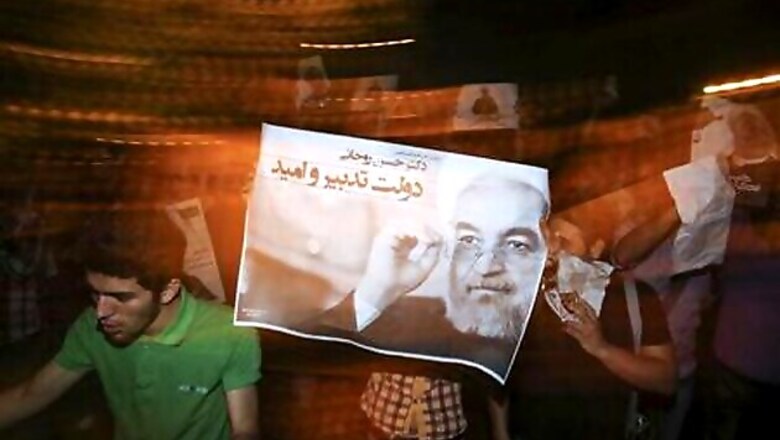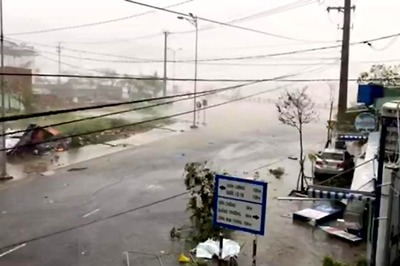
views
Iran's new president, a moderate cleric known for his conciliatory nuclear talks with world powers, will take office carrying the hopes of reformists seeking less repression of social freedoms and a more pragmatic foreign policy.
Hassan Rohani is someone world powers are likely to welcome as the successor to hardline populist incumbent Mahmoud Ahmadinejad, hoping he might pursue peaceful ways out of an increasingly tense standoff with Iran over its nuclear activity.
To the surprise of many, Rohani polled just over 50 percent of the votes cast in Friday's election, according to the interior ministry, good enough for a landslide first-round victory over conservatives close to Supreme Leader Ayatollah Ali Khamenei.
Rohani's focus on rehabilitating Iran's foreign relations and its sanctions-damaged economy and his call for a "civil rights charter" proved appealing to the significant number of Iranians keen for more political pluralism at home and an end to the Islamic Republic's isolation abroad.
The former nuclear negotiator's bridge-building track record secured the vote of pro-reform Iranians politically muzzled for years, but he could also work well with the wary Khamenei thanks to his impeccable background in Iran's clerical establishment.
Khamenei's grip faltered in 2009 when millions of Iranians took to the streets in protests - stamped out by security forces after months of deadly violence - over alleged fraud in Ahmadinejad's first-round re-election.
Khamenei, who has the last say on over-arching state policies including security and the nuclear programme, was widely seen as wanting a loyal hardline "principlist" to win big without dispute this time around.
But U.S.-based Iranian analyst Trita Parsi suggested Rohani's resounding election triumph showed the evolving balance of power in Iran was more complex than many had reckoned.
"Though hardliners remain in control of key aspects of Iran's political system, the centrists and reformists have proven that even when the cards are stacked against them, they can still prevail due to their support among the population," Parsi wrote in an emailed commentary.
Rohani managed to win with a constituency - whose core was believed to be the urban middle class and young - that had been widely disillusioned by years of security crackdowns that stifled virtually any public dissent from Islamist orthodoxy.
Reformists led by former president Mohammad Khatami resurfaced from quiescence to endorse Rohani earlier this month after their own candidate withdrew from a field dominated by conservative Khamenei loyalists.
Rohani picked up further momentum with the endorsement of his mentor, former president Akbar Hashemi Rafsanjani, a veteran rival of Khamenei who was disqualified from running last month.
Rohani has pledged to draw up and implement a "civil rights charter, promote a foreign policy based on "constructive interaction with the world", and has spoken up for the rights of women and ethnic minorities.
CRITICISM OVER CONCILIATORY TALKS
Rohani, 64, headed the Supreme National Security Council under Rafsanjani, a relative pragmatist seen as a master of realpolitik, and under Khatami, who pursued wide-ranging social and political reforms ultimately blocked by hardliners in the dominant elite of clerics and Revolutionary Guards commanders.
He presided over talks with Britain, France and Germany that saw Iran agree in 2003 to suspend uranium enrichment-related activities pending further negotiations on trade and diplomatic concessions to Iran ultimately undone by mutual mistrust.
He resigned after Ahmadinejad took office in August 2005; enrichment activity resumed and expanded. Rohani was accused of being too accommodating in negotiations - a criticism that hardline rivals tried to exploit.
But Rohani deftly counter-attacked. In a May 27 interview on Iranian state television, Rohani sparred with a news anchor, calling him "illiterate" for saying Iran's nuclear programme had stopped during his tenure as negotiator.
"This is a lie," he said. Rohani noted that Iran had continued to make advances in nuclear know-how while he headed its security council and he had steered the country away from threats of Israeli or U.S. attack on its nuclear sites.
"We didn't allow Iran to be attacked. Remember the sensitive conditions at the time ... they had gotten Afghanistan, they had occupied Iraq. They imagined tomorrow or the day after tomorrow it would be Iran's turn," referring to the U.S. military.
REVOLUTIONARY CREDENTIALS
No one questions the revolutionary pedigree of the mid-level Shi'ite cleric, who was active in the opposition that overthrew the U.S.-backed shah in 1979. He remains on the security council and on the Expediency Council and the Assembly of Experts, two influential advisory bodies in the multi-tiered power structure.
Rohani boasts military experience through prominent roles in Iran's 1980-88 war with Iraq, including as commander of national air defence, according to his official biography.
He has, however, maintained a centrist outlook shared with former president Rafsanjani, a close ally.
Rohani hinted he would stand aside if Rafsanjani joined the race. But the Guardian Council, the state body that vets all election candidates, barred Rafsanjani, who would have posed the most significant independent threat to Khamenei's supremacy.
Rohani criticised the pre-election increase of police and Islamist militia in the streets, apparently to deter any temptation for new unrest. "Why should there be a security atmosphere everywhere? In the streets, universities, schools, organisations, we must put an end to this security atmosphere."
BROKEN ECONOMY
During Ahmadinejad's two terms in office, friction with the West over the nuclear programme has risen with the United States and Europe imposing sanctions on Iran's oil and banks over suspicions Tehran is seeking atomic bombs, something it denies.
The tightening international vice has sent Iran's currency, the rial, into steep decline and exacerbated the impact of what critics say was Ahmadinejad's shambolic economic management.
Rohani has bemoaned the plight of the economy and, suggesting it was caused in part by the increasing ostracism of Iran over its intransigence in the nuclear dispute, pledged the creation of a "government of prudence and hope" if elected.
"Looking at the state of the country and urban and rural problems, the young and the old, the students ... everyone knows what problems and social issues we are facing in everyday life," he said in a recent interview on state television. "Is there a family out there that isn't affected by unemployment?"




















Comments
0 comment